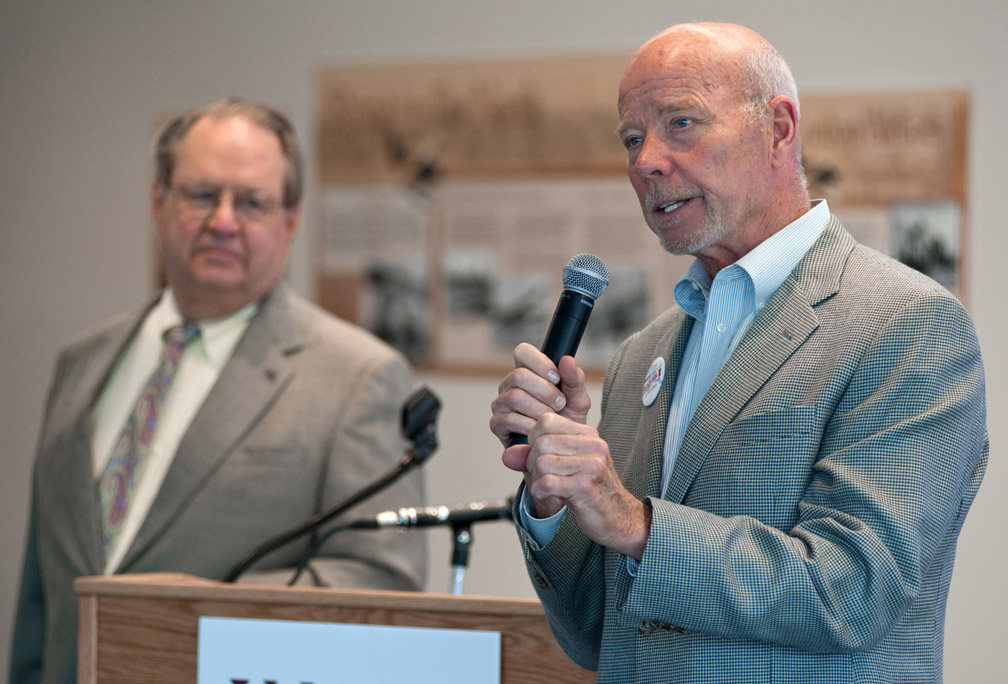JUNEAU — The Juneau Chamber of Commerce’s weekly luncheon was much more crowded than usual July 10 with one of the state’s hottest topics on the agenda. The issue up for discussion? The “More Alaska Production Act” or “The Giveaway,” depending on which side you ask.
The chamber’s board invited representatives from both sides of the Senate Bill 21 repeal effort — aptly named the Vote No and Vote Yes campaigns — to state their cases to many of the capital city’s business leaders. During the state primary election next month, voters will be asked in Ballot Measure 1 whether they want to repeal an oil tax cut approved by the Alaska Legislature in 2013.
The chamber’s endorsement was not at stake — its board approved a resolution supporting SB 21 back in February — but the opinion of Juneau’s business owners was up for grabs. On Thursday, both presenters urged employers to talk about the issue with their employees.
Gregg Erickson with the Vote Yes on 1 Campaign spoke first. The Vote Yes side wants to repeal the oil tax law.
Anticipating a point to be made by his opponent, Erickson unexpectedly started by openly endorsing the claim that SB 21 will lead to more oil production on the North Slope.
“It’s clear: when we reduce our taxes on the oil companies, we’re going to elicit more investment. More investment is going to produce more oil, but that’s not the question,” Erickson said. “The real question is, ‘Is it going to make Alaska better off?’ The answer is just as clear … The answer is no.
“It will not benefit Alaska,” he added.
That’s because the increase in production is not enough to offset the decline in tax revenue, he said. SB 21 cuts Alaska’s total oil revenue — at oil prices currently being forecasted by the Alaska Department of Revenue — by 11 percent. The state expects production to rise by only 4 percent, Erickson explained.
“Do the math — an 11 percent cut in revenue plus a 4 percent increase in production — that leaves us 7 percent in the hole, and that’s 7 percent of state petroleum revenue that can’t be used for stimulating diversification of our economy, for taking care of social needs or for providing for education,” Erickson said.
During a question-and-answer session following both presenters, a local businessman said directly comparing a decline in revenue with production was “comparing apples and oranges,” but Erickson disagreed, saying it was essentially the same thing.
Rather than focusing his presentation on economics — such as increased investment and busy sub-contractors in Fairbanks and Anchorage — former Anchorage mayor Rick Mystrom of the Vote No campaign instead promoted the state’s working relationship with Big Oil.
“This is the richest state per capita in the history of America, and so I don’t think anybody can say it hasn’t been a good partnership,” Mystrom said. “It’s helped us all — it helps us all every day.”
The potential of that partnership is at risk this August, Mystrom said.
“How could anybody invest in their business long term if their biggest expense (taxes) went up and down six times in 10 years?” Mystrom said. “You can’t do it.
“If the ‘yes’ vote prevails, I can tell you oil production will continue to decline,” he added shortly after.
He referenced conversations he’s had with architects across the state about how large projects have been put on hold until Aug. 20 — the date after the primary election. “Those projects will not restart if this vote passes,” he said.
Both presenters said the other side’s name for SB 21 — “The Giveaway” to its opponents, and the “More Alaska Production Act” to its supporters — is nothing more than a sales pitch to Alaska voters.
Opponents of the repeal have said that without SB21, investment could be lost and projects shut down. Erickson called that rhetoric a “campaign of fear.”
Mystrom said the “giveaway” notion being advertised by opponents is purely fictional.
Ultimately, Erickson’s message focused on a distrust of Big Oil and a need for diversifying Alaska’s economy — both within the petroleum sector and outside it — and Mystrom keyed on the potential if the state stops changing its oil tax structure.
Matt Woolbright is a reporter for the Juneau Empire.
Friend, foe of oil tax repeal effort square off

Tags: Arctic Ocean, Business

